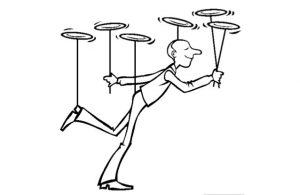Portrait of Authority
Growing effective leaders in the world of trade associations

Each weekday morning, as I arrive at work, I’m always curious to see if the daily newspaper is still sitting outside our building’s front door. Has someone picked it up, or did the folks already inside walk by and leave it for someone else? In the eight-plus years I’ve worked at Naylor, I’ve never asked who the paper is for, but the intended recipient isn’t the point. Regardless of who is waiting on it, there are a few folks in every workplace who will expend a small amount of energy to grab the paper and drop it on the front desk on their way inside.
These altruistic people gain nothing from their actions—they won’t get a raise, learn a new skill or even get a pat on the back—but they take the time to grab it because something in them won’t let them not pick it up. Whether they realize it or not, that urge is called “leadership.”
Good leaders are accountable to those around them and never ask people to do something they wouldn’t do themselves.
The trade association world is filled with accidental leaders. More often than not, they rise to the occasion.
Many association leaders have small staffs. They must juggle multiple responsibilities while making quick, confident decisions.
 To offer another example, several years ago, some friends of mine participated in a leadership conference during which one of the retreat’s speakers intentionally tipped over a trashcan, leaving a mess in a common area. It was easily visible to just about everyone in attendance, but the garbage pile sat untouched for the duration of the retreat. No one took ownership of the situation or marshaled the help necessary to clean it up. “I didn’t make the mess,” they reasoned to themselves. “Why should I clean it up?”
To offer another example, several years ago, some friends of mine participated in a leadership conference during which one of the retreat’s speakers intentionally tipped over a trashcan, leaving a mess in a common area. It was easily visible to just about everyone in attendance, but the garbage pile sat untouched for the duration of the retreat. No one took ownership of the situation or marshaled the help necessary to clean it up. “I didn’t make the mess,” they reasoned to themselves. “Why should I clean it up?”
I wish I had a photograph of attendees’ faces when the speaker let the cat out of the bag about his trash-pile experiment at the retreat’s closing session.
Throughout my life, I have been faced with similar opportunities to take an extra step and fix a situation that didn’t seem to be my responsibility. Certainly I’ve passed on far more opportunities than I’ve seized—and there is wisdom in knowing when to fix something yourself and when to let someone else handle it—but it’s comforting to know that there will always be another chance to step up. Leadership opportunities are everywhere.
Don’t fall into the trap of viewing leadership as what someone does when the zombie apocalypse hits and survival depends on getting people to follow orders like Rick Grimes from The Walking Dead. Leadership often starts with the simple act of being accountable to those around you and never asking anyone to do something you’re not willing to do yourself. There’s no reason to wait for an army of undead walkers to appear on your doorstep to become a leader.
Along the way
For better or worse, the world is filled with accidental leaders—those who find themselves in leadership positions despite never asking for that responsibility—and nowhere is this more apparent than in the trade association realm. Maybe these accidental leaders were really good at their job and got a promotion into leadership; or maybe the association’s executive director left suddenly and created a vacancy that needed to be filled faster than someone with experience could be found to fill it. As many of you know, this happens all the time in our world.
As someone who was promoted into a supervisory position at a shopping-mall fast food restaurant at 17 years old, I can relate in some small way to the accidental leader. I wasn’t even old enough to operate the trash compactor legally or ride alone in the service elevator, and the job wasn’t one I thought I’d hold for more than a year or two at most. So I clearly had no designs on a managerial job. Yet, somehow I found myself supervising up to a dozen people at any given time and was running a restaurant. I experienced plenty of failures—I was a teenager, after all—but it was an enormous learning opportunity, as I was constantly called on to make tough, rapid-fire decisions of the life-changing kind: Do we have enough ketchup packets out to make it through the dinner rush? Can we give this customer a refund since he was given lemonade when he clearly ordered tea? Which lucky employee gets to clean up the vomit from the sick little girl next to register three? Sure, these are lighthearted examples, but being looked at constantly for authoritative decisions can be daunting, regardless of how inconsequential they may seem.
Quality or quantity
 With limited resources, association leaders often find themselves juggling the responsibilities of multiple staff members. Learning to make quick, confident decisions can be an added challenge to an already full workload. Many associations operate on razor-thin margins on the front lines of their respective industries, and such an atmosphere can be stressful. But, while the opportunity for failure is great, the chance for success is magnificent. Perhaps it’s no coincidence that many trade associations have some of the finest leaders of any organization, big or small.
With limited resources, association leaders often find themselves juggling the responsibilities of multiple staff members. Learning to make quick, confident decisions can be an added challenge to an already full workload. Many associations operate on razor-thin margins on the front lines of their respective industries, and such an atmosphere can be stressful. But, while the opportunity for failure is great, the chance for success is magnificent. Perhaps it’s no coincidence that many trade associations have some of the finest leaders of any organization, big or small.
Put another way, for a military commander to be an effective leader, he or she must be intimately familiar with the ins and outs of the operations of the troops. With such familiarity comes an ability to anticipate and address problems simultaneously. These officers lead effectively because they know firsthand about the struggles their soldiers are facing, and they have the larger goal in mind.
Though it’s certainly no battlefield, the association world, like the workplace as a whole, can feel like a warzone sometimes. Further, no one should intentionally try to make someone else’s life more difficult—just don’t talk to my kids about this philosophy; they swear that I give them chores simply to make their lives tougher.
With that in mind, I try to help out at work as much as I can with problems that aren’t necessarily mine to solve, and that extends to picking up the newspaper outside the front door.
It’s kind of like being a good parent. This philosophy certainly hasn’t helped me in any professional capacity, but knowing that I might be helping someone else through an act as insignificant and simple as picking up the office newspaper helps me start my day with a smile.
There is no such thing as a perfect leader, and anyone who’s ever been on a team that I’ve managed will certainly tell you as much. The best I can do is to try and learn from my mistakes and be open to criticism from team members past and present, as well as from those tasked with leading me.
What can you do?
Countless books have been written on the topic of leadership, but being an effective leader can often start with something as simple as bending over to pick up a newspaper. Don’t wait for the person behind you to take care of something you could handle yourself. Be a leader.
Besides, if you work at a small staff association if you don’t pick up the paper, chances are no one else will.
Carter Davis is the Directory Content Strategy & Development Manager for Naylor Association Solutions.

